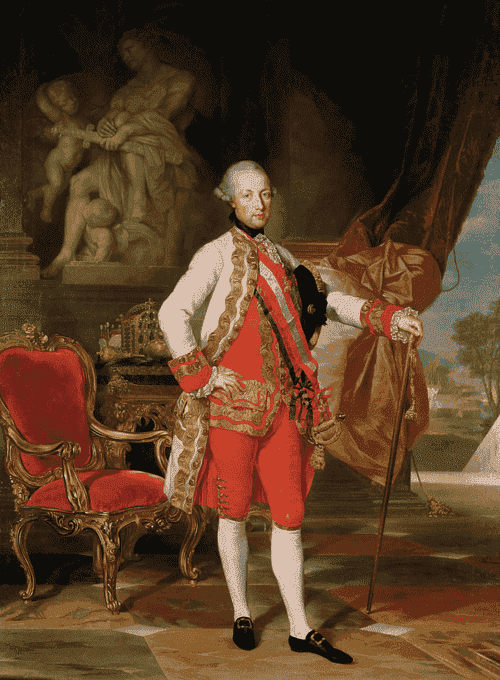Table of contents Show
Joseph II Holy Roman Emperor (1741-1790) was the ruler of the Holy Roman Empire from 1765 to his demise. He was a pivotal figure in the era of Enlightenment and was among the Habsburg dynasty’s most ambitious reformists. Despite his brief rule, Joseph II Holy Roman Emperor made a lasting impression on Austria and Europe as a whole, acquiring a reputation as a bold reformist and visionary leader.
As Empress Maria Theresa’s firstborn son, Emperor Joseph II ruled Austria together with his mother between 1765 and 1780 before ruling on his own until 1790. His reign is distinguished by broad reforms to modernize the state, consolidate authority, and advance Enlightenment principles.
One of Joseph II’s major achievements was the establishment of freedom of religion in Austria. During a period of widespread conflict over religion in Europe, Joseph II issued the Edict of Tolerance in 1781, granting freedom of religion to all citizens, no matter their faith. This action was not only innovative at that point, but it also represented a significant shift from the region’s long-standing Catholic supremacy.
Who Was Joseph II, Holy Roman Emperor?
Emperor Joseph II of Austria was the first son of Empress Maria Theresa and Emperor Francis I. His father died in 1765, and he ascended to the throne that year. From the start of his rule, Joseph II Holy Roman Emperor aspired to improve and centralize the Habsburg Monarchy, launching an ambitious reform agenda.
One of the most notable traits of Joseph II’s reign was his dedication to tolerance of religion and freedom. In 1781, he issued the Patent of Toleration, which granted freedom of religion to Protestants and Jews throughout the Habsburg domains. He also strove to streamline the monarchy’s management by enacting a series of administrative changes aimed at creating a better functioning and centralized government.
The reforms of Emperor Joseph II of Austria reforms went beyond religious and administrative issues. He also strove to enhance his subjects’ standard of living and rights, ending serfdom in 1781 and instituting measures to benefit the peasantry. He also fostered education and the arts, opening new schools and theaters around the Habsburg domains.
Despite his intentions being noble, Joseph II faced strong opposition from the ruling class and church, who viewed his reforms as a danger to their customary privileges. His attempts to implement drastic changes were frequently met with resistance, causing turmoil and rebellion throughout the empire.
The Reforms of Emperor Joseph II
Famous for his vast reforms that sought to modernize the Habsburg Monarchy and the wider Holy Roman Empire, Joseph II Holy Roman Emperor (1741–1790) was among the most progressive kings of the 18th century. His policies were shaped by the principles of social justice, religious tolerance, and rational government that emerged during the Enlightenment.
Emperor Joseph II reforms
Though well-intentioned, several of his reforms encountered opposition and had mixed results in the end. They included:
Administrative reforms
Streamlining and centralizing the administrative framework of the Habsburg Empire was among Joseph II’s primary aims. His goal in instituting these administrative changes was to give the central government more power and give the nobles less. For the sake of the empire’s financial security, Joseph II instituted reforms to the economy, including the elimination of serfdom and the adoption of new land reforms.
Religious reforms
The religious organizations of the Habsburg Empire were another target of the efforts of the Holy Roman Emperor Joseph II to modernize alongside his administrative reforms. By issuing the Edict of Tolerance in 1781, he aimed to limit the influence of the Catholic Church while also granting religious freedom to Protestants and Jews. Another measure Joseph II used to lessen the Church’s societal impact was to dissolve numerous religious organizations, such as convents and monasteries.
Social reforms
Additionally, Joseph II was an early leader in social reform, enacting policies to raise the standard of living for the working class and advance equality for all people. He instituted new policies for schools, built hospitals and orphanages, and took steps to better the lives of the underprivileged by reducing their poverty. With his social reforms, Joseph II Holy Roman Emperor sought to build a more equitable society in which every person might realize his or her full potential.
The results of Joseph II’s new policies
Austria and the wider Holy Roman Empire were deeply affected by the changes enacted by Holy Roman Emperor Joseph II, even though many were controversial:
Stubborn opposition
The local elites, the Catholic Church, and the ruling class in numerous countries, especially the Austrian Netherlands and Hungary, were very resistant to his reforms. Significant policy changes or rollbacks occurred following Joseph’s death in 1790.
Long-term legacy
Despite the transience of many changes, some, such as the growth of religious tolerance and the end of serfdom, left an indelible mark on society. Inspiring Enlightenment-style government throughout Europe, his modernization initiatives paved the way for further reforms inside the Habsburg Monarchy.
Joseph II and His Relationship with Mozart
Emperor Joseph II and Mozart had a close and complicated relationship that shaped the composer’s work. Joseph II was renowned for his love of music and support of the arts, and it was thanks to his support that Mozart was able to prosper and compose some of his most well-known pieces.
Joseph II Holy Roman Emperor was a huge fan of Mozart’s work and considered him a beneficial addition to his court. He welcomed Mozart to Vienna, where he spent much of his time creating and playing for the emperor and his court. Joseph II’s backing and encouragement assisted Mozart in gaining a reputation and securing key assignments, like his opera “The Marriage of Figaro.”
The relationship between Emperor Joseph II and Mozart was more than just professional; the two men had a strong mutual respect and friendship. Mozart also composed several pieces of music for the emperor, including his renowned “Coronation” Mass. Their friendship was founded on a mutual love of music and a desire to promote the arts in Austria.
In the film “Amadeus,” Joseph II is presented as a conflicted persona: on the one hand, he is a passionate lover of the arts and an admirer of Mozart; on the other hand, he is shown as a ruler who is readily swayed by the ideas of others. Despite this, it is apparent that Joseph II had a substantial impact on Mozart’s career, giving him the tools and opportunities he required for success.
Beethoven’s “Cantata on the Death of Emperor Joseph II”
In 1790, Ludwig van Beethoven wrote “Cantata on the Death of Emperor Joseph II” (WoO 87) to commemorate his death. Beethoven wrote the Cantata at age 19 to honor Joseph’s enlightened administration and reforms. Beethoven never performed the piece, but it is now known for its emotional depth and foreshadows his later work.
Beethoven’s cantata expresses both grief for the emperor’s death and enthusiasm for his revolutionary reforms with great emotion. Joseph II’s followers saw him as heroic and noble, and the music’s dramatic orchestration and vocal lines conveyed the Austrian people’s grandeur and tragedy.
The cantata’s musical excellence and historical and cultural relevance make it important. It shows public admiration for Joseph II Holy Roman Emperor and his contributions to Austrian civilization. The piece was initially disregarded but is now considered an early example of Beethoven’s ability to integrate music with political and cultural topics.
Joseph II, Marie Antoinette, and the Habsburg Family
The powerful Habsburg dynasty included Emperor Joseph II and Marie Antoinette, Queen of France. Their relationship was tied to their mother, Empress Maria Theresa, who sought Habsburg influence through planned marriages. They were close, but their political dealings during Joseph’s reign were complicated, especially as Europe was upended in the late 18th century.
Joseph II and Marie Antoinette were close throughout their lives. Joseph, being older, protected and advised his younger sister, who married Louis XVI of France at 14 in 1770 as part of an Austria-France alliance. Joseph frequently offered Marie Antoinette political advice in their affectionate correspondence.
As Holy Roman Emperor, Joseph II concentrated on reforming and modernizing the Habsburg Monarchy. Centralizing power, promoting religious tolerance, and abolishing serfdom characterized his reign. The French Revolution changed Europe’s political landscape, therefore his relationship with Marie Antoinette had political consequences.
The French Revolution in 1789 destabilized the monarchy and put Marie Antoinette under close scrutiny. Joseph II Holy Roman Emperor died in 1790 before the Revolution’s full effects, leaving his sister to endure the turbulence and her execution in 1793.
The Legacy of Emperor Joseph II in Austria
Emperor Joseph II (1741-1790) is known as one of the most powerful monarchs of the Habsburg Monarchy and a major proponent of Enlightenment principles in Europe.
Emperor Joseph II’s legacy in Austria is defined by his drive to modernize the state via religious tolerance, the elimination of serfdom, and the centralization of authority. Though his ambitious changes were met with opposition, they had a lasting effect on Austria’s social, legal, and cultural growth. Joseph II Holy Roman Emperor is seen as an enlightened monarch, and his influence may still be felt in Austria’s modern institutions and culture.
Featured image credits: By Anton von Maron – Kunsthistorisches Museum Wien, Bilddatenbank.





